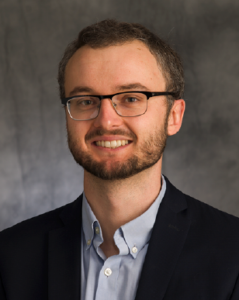Read Nick’s Emerging Investigator article, Electron and ion transport in semi-dilute conjugated polyelectrolytes: view from a coarse-grained tight binding model , DOI: 10.1039/D2ME00285J
- How do you feel about MSDE as a place to publish research on this topic?
I think that MSDE is an outstanding venue to publish research at the intersection of chemistry, materials science, and chemical engineering.2. What aspect of your work are you most excited about at the moment and what do you find most challenging about your research?At present I am most excited about trying to make quantum chemical predictions accessible to soft materials length scales (~10-100 nm), which are currently out of reach for traditional methods. These method development efforts typically require familiarity with state-of-the-art advances in machine learning, coarse-graining, and electronic structure calculations, which can be very difficult to keep on top of.
3. In your opinion, what are the most important questions to be asked/answered in this field of research?The most important question that needs an answer in this field is if we can make coarse-grained electronic structure predictions as accurate and easy to use as traditional black-box quantum chemistry calculations. Time will tell!
4. Can you share one piece of career-related advice or wisdom with other early career scientists?
Follow the ideas that are YOUR ideas and that YOU are passionate about. Try not to let emerging research trends or fads distract you too much from what you are excited to be working on! The job is a lot more enjoyable when you are working on topics you love and not just trying to keep up with the Joneses.











